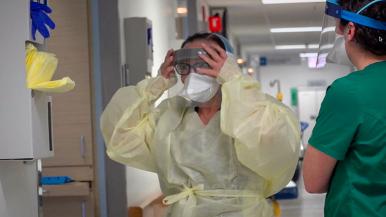A program that helps Rush University Medical Center nurses and other staff members process the emotional stress of caring for COVID-19 patients is gaining national attention — in part due to the innovative use of therapeutic techniques designed to help military combat veterans.
Bereavement support and education coordinator Kim Sangster, LCSW, designed the Growing Forward program last year while supporting staff members on the units where thousands of patients survived COVID-19 — but where a great many also died.
An expert in the importance in processing grief, Sangster helped staff members on some units develop simple yet solemn group practices — like writing down and saying the names of patients who died, or pausing to celebrate daily chimes for the number of patients going home that day.
Holistic approach
And she draws from history to illustrate how much nurses and other staff members could benefit from having a safe place and safe time to share their feelings and concerns with colleagues who have been through the same experiences.
“Think of soldiers coming home from World War II,” Sangster said. “We know that the time they spent on boats coming back from Europe or the Pacific, talking through what they saw and experienced, helped many of them move forward. Knowing they weren’t went alone mattered very much.”
Watch CNN's report on the Growing Forward program
The six-session program is part of a wider, holistic approach to care for the emotional wellness of nurses systemwide and was piloted on the general medicine 7 North unit last fall. Each session allowed nurses to reflect on and describe their shared experiences, and the words “hero” and “resilient,” Sangster notes, were rarely used.
“Nurses got tired of being told how heroic they are. And urging them to stay resilient suggested to many that they were somehow broken and needed encouragement. But they were not broken. They're still here. They're still standing,” Sangster said.
'Front lines' and 'combat duty' more than metaphors
Other parallels to combat experience proved to be especially relevant. Road Home Program chaplain Mark “Chaps” Schimmelpfennig was a key member of the wellness rounds — an interdisciplinary effort to proactively engage staff by bringing food, water and emotional support to units treating COVID-19 patients. He quickly began to notice how the experiences and emotions frontline staff would share echoed those of many of the combat veterans he has helped deal with what is known as “moral injury.”
“Moral beliefs and expectations are at the core of who we are as human beings — they are what matter to us, what we love,” Schimmelpfennig said. “So experiences that run counter to — or injure — those beliefs can result in feelings like anger, guilt, shame, or helplessness.”
At the Road Home Program, which has provided free mental health care to thousands of veterans and their families since 2014, Schimmelpfennig has counseled hundreds of veterans struggling to transition to civilian life. He recalls that the emotions and concerns they often share were echoed by Rush staff members.
“Words and phrases that compared months of treating hundreds of COVID-19 patients to military combat — like ‘front lines’ or ‘combat duty' — weren’t just metaphors. They were very real,” the Army veteran added.
“He could actually draw that parallel between us and people that have been veterans of war,” Sarah Saladino, assistant unit director on 7N told the Wall Street Journal. “I never even made that connection because for me — I’ve been a nurse for 20 years on this unit—I’ve never seen this kind of trauma to our team ever. So when he made that connection, I was like, oh my gosh, how have I never realized that?”
“It feels crazy to be compared to a war veteran who is going through PTSD,” 7 North’s Catherine King, RN, explained in an interview with the Scripps News Service. “You've experienced a trauma. You know, you have wounded morale. I think it was really nice to feel recognized and validated. I felt putting a term on it could help me process and grieve and come above it.”
The Growing Forward program piloted on 7 North is expected to be offered again later this winter for nurses and team members on other units, but the learnings have already helped prepare newly hired nurses, 7 North’s Arbie Karasek, RN, told the Wall Street Journal.
“I think I’m able to train nurses better because I have the words for what I’m processing, too. It feels like training new people who are new to the profession, specifically the training we have to give them now is also emotional armor and emotional resilience. That’s just as important as teaching them how to place an IV or how to give the medications or how to administer oxygen."

